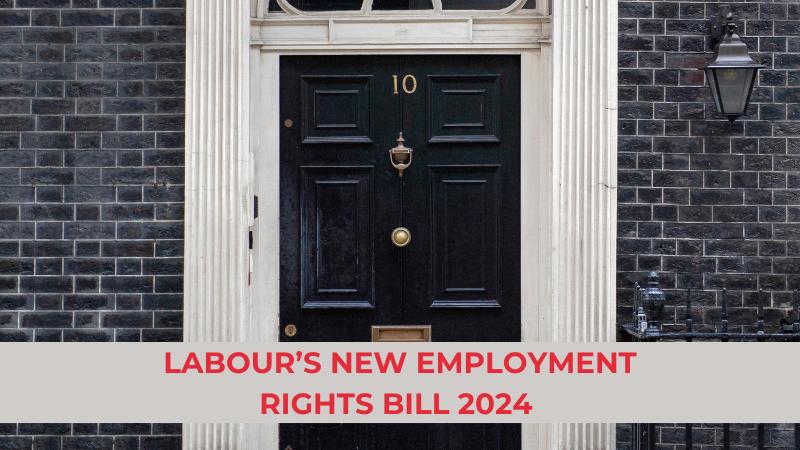On 10th October 2024, the new Labour government published their much-anticipated Employment Rights Bill. Press releases before the event hyped the Bill up as the most significant reform to employment rights in a generation, but does the reality live up to the hype, and should employers be worried or relieved?
Here we will sort the reality from the speculation and run through everything we know so far. Many of the reforms will not actually be implemented until at least 2026, so there is plenty of time to get ready.
Taking each of the proposals in turn we will summarise their key points.
1. Day One protection from Unfair Dismissal
- There will be a statutory probationary period of 6 or 9 months (still to be determined).
- During this probationary period an employee can be dismissed provided that the reason for dismissal is for capability, conduct, or some other substantial reason.
- The fine details around this have yet to be clarified but it is expected that there will be some formality in the process even during the probationary period and evidence will be needed that the reason for the dismissal falls within one of the reasons allowed.
2. Protection from “Fire and Re-hire”
- It will be an automatically unfair dismissal if the employer dismisses after they have tried to agree varied terms of contracts with an employee and the employee has refused.
- The dismissal will also be unfair if the employer replaces the employee with another person carrying out substantially the same duties and who is willing to accept the varied terms.
- To avoid a dismissal being unfair, the employer will have to show that the required variation of the contact was to avoid financial difficulties that would affect the employer’s ability to carry on the business as a going concern and they could not avoid making the variation in the contract.
- Further details are needed as to what constitutes a “going concern” but the indication is that the threshold will be high.
3. Collective Redundancies
- The collective redundancies obligations will include simultaneous redundancies in different locations. Previously this was not the case.
- This means that all locations must be included when counting up to see if 20 employees are affected, rather than needing 20 in each affected location.
4. Preventing Sexual Harassment
- There is an extension of the duty coming into force on 26 October 2024 that employers will need to take ‘all reasonable steps’ to prevent sexual harassment of their employees.
- This will include carrying out assessments of a specified description, publishing plans or policies, and taking steps relating to the handling of complaints and reporting of sexual harassment.
- There will be a new category of protected disclosure in respect of sexual harassment
- An employer is prohibited from permitting a third party to harass an employee during the course of their employment. The employer will be taken to have permitted the harassment if it fails to take all reasonable steps to prevent the third party from doing so. What reasonable steps an employer is required to take in these circumstances will still need some clarification.
5. Equality Action Plans
- Employers with over 250 employees will be required to publish action plans showing the steps they are taking to achieve gender equality in their organisations.
- These plans must include how they are addressing any gender pay gap and supporting women going through the menopause.
- Employers cannot be required to publish the information more than once a year.
6. Zero-Hours Contracts and Guaranteed Hours
- Employers of workers on zero-hours (or low-hours) contracts are required to offer those workers a contract, or vary their existing contract, to guarantee them a minimum number of hours that reflect the amount of work they have carried out in any given reference period (originally floated as 12 weeks, but the length is in fact to be confirmed). Workers are then entitled to accept or refuse such an offer.
- If an employee rejects the offer, the employer is required to re-make the offer at the end of every reference period.
- The offer needs to guarantee the same number of hours as in the reference period, but also the same days and times or working pattern as in the reference period.
- The offer cannot be any less favourable than the worker’s existing terms.
- The provisions also extend to low-hours contracts.
- Employers are required to provide reasonable notice of shifts and shift changes or cancellations to workers on irregular shift patterns or under zero-hours contracts.
- The minimum notice provisions need to be confirmed.
Further detail is needed to understand the true impact of this legislation for employers.
7. A Presumption in Favour of Flexible Working
Employees already have a right to request flexible working from “day one” but this Bill confirms that:
- an employer can only refuse a request on the specified grounds, but the refusal must also be reasonable.
- at the time of rejecting the request an employer must:
- state the ground(s) under the legislation which it relies on, and
- explain why it considers that it is reasonable to refuse the request.
8. Duty to keep records in certain sectors
- There will be increased requirements for employers to keep records of the reasoning behind their decisions and explanations given to employees when justifying decisions.
- The exact form of records, how long they will need to be kept and the consequences of not providing them is still uncertain.
9. Bereavement Leave
- Parental Bereavement Leave legislation is changed into a general entitlement to Bereavement Leave and will become a day-one right.
- More detail is required but where the deceased is a child, leave remains at two weeks. In all other cases, leave is limited to one week.
10. Family friendly leave
- Parental Leave and Paternity Leave will become day-one employment rights
- Paternity Leave may now be taken in addition to and following Shared Parental Leave.
11. Tips
- The Employment (Allocation of Tips) Act 2023 already requires that employers ensure that tips are fairly allocated.
- There is a requirement for a written policy and a Code of Practice.
- There is an obligation to consult trade union or other worker representatives before producing a written policy.
- The policy must be reviewed every three years, with the same consultation process taking place at each review.
- The written policy and a written summary of the consultation must be made available to all workers.
12. Statutory Sick Pay
- Statutory Sick Pay (SSP) will be paid from the first day of sickness absence instead of the current entitlement from day four.
- The minimum earnings threshold to become eligible for SSP is to be removed, with SSP instead being set at the lower amount (currently £116.75) and a specified percentage of a worker’s weekly earnings with the percentage to be determined.
13. National Minimum Wage
- It had been proposed that the age bands will be removed on the grounds that they are discriminatory.
- NMW rates will be set taking account of cost-of-living increases in order to address low pay.
14. Trade Union Reform
- Workers will have a right to a statement of trade union rights at the same time as they are entitled to receive a section 1 statement of their terms of employment (i.e. for most employers this needs to be included in their contract of employment).
- Unions will have the right to request access to workplaces for the purposes of meeting, recruiting or organising workers or facilitating collective bargaining (not to organise strikes).
- Employers will be under a duty to take reasonable steps to facilitate access and will only be able to refuse access if it is reasonable to do so because it will unreasonably interfere with the employer’s business.
- Disputes about access will be determined by the Central Arbitration Committee.
- There will be increased duties on employers to provide ‘such accommodation or facilities as are reasonable in the circumstances’ to undertake union activities.
- Thresholds for trade union recognition and voting are to be lowered.
- The requirement for a recognition ballot to have a turnout of at least 40% of the relevant bargaining unit in order to be valid is to be removed.
- The ballot requirements for industrial action are to be changed to a simple majority of those who vote in the ballot rather than 50% of union members (40% in local authorities).
- There is no longer a requirement for Unions to supervise pickets to avoid liability in tort.
- Workers are to be given statutory protection from detriment or dismissal to prevent, deter or punish a worker for taking industrial action. The blacklisting ban in section 3 of the Employment Relations Act 1999 has also been expanded.
15. Introducing sector-wide collective bargaining
- The School Support Staff Negotiating Body is to be restored and there will be a new power to create an Adult Social Care Negotiating Body.
- These bodies have the power to negotiate the terms and conditions and pay of workers in their sector (and, in the case of School Support Staff, also negotiate their training and career progression).
16. Enforcement of employment matters
- A new enforcement agency, the “Fair Work Agency” will be established to bring together existing enforcement powers and also to enforce rights such as holiday pay.
- Minimum Service Levels legislation introduced by the previous Government will be repealed.
Looking across these 16 areas we can see that there are some major changes, but still a lot in the Bill that needs to be clarified and requires consultation. Labour has pushed through the Bill in their first 100 days of government in line with their manifesto promise. However, we will have to wait a lot longer for many of the actual details to be clear and longer still before many of the changes become law.
In addition, there are several changes that we expected to be included but weren’t. For example:
- A “right to switch off” stopping employers from contacting employees out of hours (like that introduced in France)
- Simplification of the existing system of employees, workers and self-employed staff
- New requirements for larger employers to report on pay gaps
- An overhaul of the parental and carers leave system
This leaves the door open for further changes as we progress through Labour’s first term in office. There also needs to be some thought by the Government as to how the Employment Tribunal system will cope with the impact of all the changes with such a backlog of cases already stuck in the system.
Conclusion – What should employers be doing to prepare for the changes?
It is clear that there is going to be an increased burden of record keeping and justification of decisions going forward. The best advice that we can give to employers now is to get organised and be prepared! By this we mean:
- Make sure you have up to date policies, procedures and staff handbooks
- Make sure your staff are reading them and recording the fact
- Get used to following the processes and make sure that your managers understand them so you don’t get caught out
- Start working with your professional advisors to assess how the proposed changed will affect you and how you can minimise the risks and burden on your business
For all of the above, the Backhouse Solicitors team of employment specialists are here to help. Contact us today to book a free initial consultation with our friendly advisors and find out how to protect your business from unnecessary employment claims.
Tel: 01245 893400
Email: info@backhouse-solicitors.co.uk
Visit: 17 Duke Street, Chelmsford, CM1 1JU
Or send us a message through the Contact Us page on this website.






